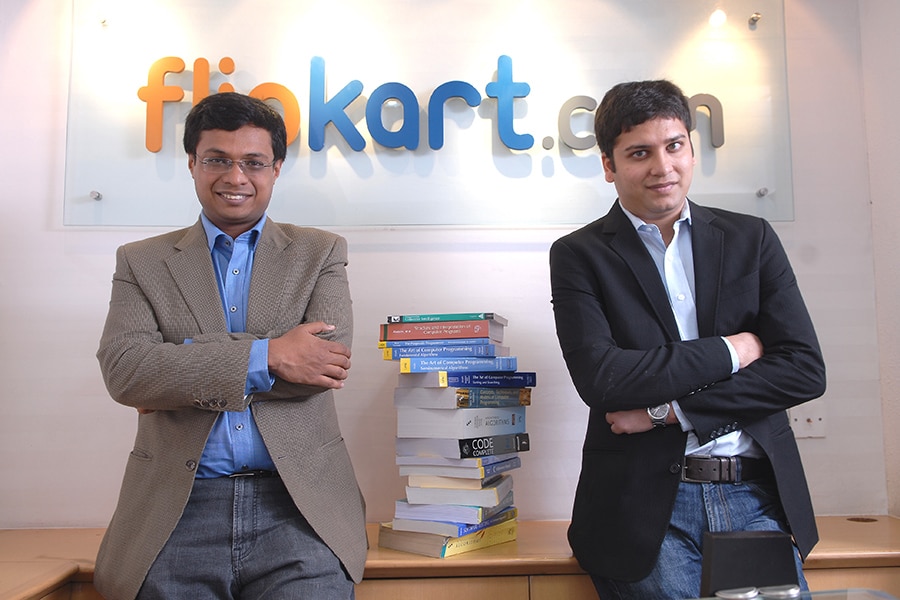End of Flipkart's Bansal days
With Binny Bansal's resignation, Flipkart has lost its founders abruptly, in a span of six months. Both left on a sour note


 Flipkart co-founder Sachin Bansal and Binny Bansal
Flipkart co-founder Sachin Bansal and Binny Bansal
Image: Hemant Mishra/Mint via Getty ImagesIn an interview to a newspaper in May 2011, Flipkart co-founder Binny Bansal had said, “Our vision was always to be the Amazon of India.” Almost seven years later, that job is done. But, both Binny and Sachin Bansal, the Flipkart co-founders, have left the company with a job unfinished — ensuring that Flipkart gets so far ahead of Amazon that the Seattle-headquartered behemoth runs out of breath playing catch up.
Flipkart may eventually succeed, but it will not be under the leadership of the Bansals. Sachin Bansal severed ties with the company earlier in May, following its acquisition by the US retail giant Walmart Inc. At the time, reports suggested that Sachin was disappointed with how the Flipkart acquisition was carried out and felt cornered by the board.
On Tuesday, Binny Bansal stepped down on allegations of “serious personal misconduct”. The allegations against Binny Bansal were of sexual harassment that he had failed to disclose during the sale talks with Walmart. However, an investigation did not find any evidence to support the allegation. Bansal also denied it in a note to Flipkart employees, saying they “left me stunned and I strongly deny them.”
He added, “The investigation, however, did bring to light lapses in judgment, particularly a lack of transparency, related to how I responded to the situation,” Binny will continue as a member of the board.
To be sure, Bansal, as the group CEO, wasn’t involved in the daily operations of Flipkart and its subsidiaries — Myntra, Jabong and Phonepe.
With Binny’s resignation, the two Bansals have something in common beyond their love for gadgets and the zeal to beat Amazon. Their abrupt departures played out within six months of the Walmart acquisition.
Earlier this year in May, when Sachin stepped down from the company he co-founded in 2007, had said in a Facebook post, “Sadly my work here is done and after 10 years, it’s time to hand over the baton and move on from Flipkart”.
On Tuesday, Binny wrote to his employees, “My plan was to continue in my current role for a few more quarters to continue the transition after closing the deal with Walmart. However, my decision to step down has been accelerated by certain personal events that have taken place in the recent past.”
To be sure, the exit of founders from the companies they built, is not unusual. Steve Jobs (Apple), Andrew Mason (Groupon), Jerry Yang (Yahoo), Martin Eberhard (Tesla), Jack Dorsey (Twitter) and Travis Kalanick (Uber) are just some examples of founders exiting their companies.
The Bansals’ departure, however, stands out because unlike in the US or China, home to several startup successes, Flipkart was by far the most successful Indian startup story, not only in terms of scale but also in the magnanimous exit it managed to secure for its investors.
The company will now be run by a battery of executives. The team will be led by ex-Tiger Global Management executive, Kalyan Krishnamurthy, who took charge in 2017 and scripted a turnaround for Flipkart when it was grappling with Amazon’s aggressive moves to wrest market share in India.
The Flipkart of tomorrow will look much different from what we have seen till 2016 (when investors started orchestrating top management changes, starting with the removal of Sachin Bansal as the CEO), sans the founders and much of the founding team.
As a professionally-run company, the show will go on at Flipkart. Cutting the chord wouldn’t be a deterrent, say industry observers.
“Flipkart is not a startup anymore. For sometime, it has been a professionally run company and not founder controlled. The DNA of the founders is often different from the DNA of the people needed to manage large companies,” says Rutvik Doshi, managing director at Inventus Capital India.
“The Bansals were needed in the early stages of building the company. What Flipkart needs now are also great managers. The persons who are brilliant at creating, say the Bansals, may not necessarily be great at managing,” Doshi added.
First Published: Nov 14, 2018, 10:50
Subscribe Now